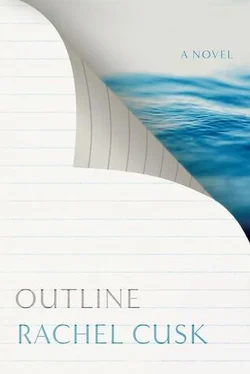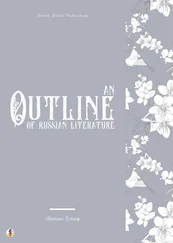A woman who was certain to be Angeliki — since there were no other diners, and no one else had entered the restaurant in all this time — had come in and was interrogating the waiter quite energetically; a conversation of inexplicable length ensued, in the course of which the two of them went outside and shortly after came back again, whereupon it continued more energetically than ever, the woman’s tawny well-cut hair swishing with the rapid movements of her head and her lovely grey dress — made of a flimsy silk material — swirling as she shifted from one foot to another, impatient as a stamping pony. She wore striking high-heeled sandals of silver leather and carried a matching bag, and would have been the picture of elegance had she not, when she turned around to look in the direction of the waiter’s pointing arm — and seen at the end of it our table — disclosed a face so extraordinarily anxious that anyone looking at it could only feel anxious too on her behalf. As Paniotis had predicted, Angeliki was chagrinned by his choice of restaurant; she had only come in here in the first place, she said, to ask for directions to the venue Paniotis had chosen, not realising that this was it, and the waiter had had to take her outside and show her the sign to convince her; and even then she felt sure that a more suitable place must be trading under the same name nearby. But I chose it specially for you, Paniotis said, his eyes bulging. The chef is from your home town, Angeliki; all your favourite Baltic dishes are on the menu. Please excuse him, Angeliki said, placing a manicured hand on my arm. She then remonstrated rapidly with Paniotis in Greek, a tirade that ended with him excusing himself from the table and disappearing off towards the toilets.
I’m so sorry I couldn’t be here earlier, Angeliki continued breathlessly. I had to attend a reception, and then return home to put my son to bed — I haven’t seen all that much of him lately, as I’ve been on tour with my book. It was a tour of Poland, she added before I could ask, mainly in Warsaw but I visited other cities too. She asked whether I had ever been to Poland and when I said that I had not, she nodded her head a little sadly. The publishers there can’t afford to invite many writers to come, she said, and it is a pity, because they need writers there in a way that people here do not. In the past year, she said, I have visited many places for the first time, or for the first time in my own right, but Poland was the tour that affected me the most, because it made me see my books not just as entertainments for the middle classes but as something vital, a lifeline in many cases, for people — largely women, it has to be admitted — who feel very much alone in their daily lives.
Angeliki picked up the carafe and melancholically poured herself a teaspoon of wine, before filling my glass almost to the brim.
‘My husband is a diplomat,’ she said, ‘so we have travelled a lot, evidently, for his work. But it feels completely different to be travelling for my work, and to be travelling independently. I admit that I have sometimes felt afraid, even in places I’m quite familiar with. And in Poland I was very nervous, because there was very little there — including the language — that I recognised. But some of it, at first, was down to the plain fact that I was unused to being by myself. For instance,’ she continued, ‘we lived in Berlin for six years, but even going there alone, as a writer, it seemed somehow alien. Partly it was because I was seeing a new aspect of the city — the literary culture, which I was absolutely outside of before — and partly because being there without my husband caused me to feel, in an entirely new way, what I actually am.’
I replied that I wasn’t sure it was possible, in marriage, to know what you actually were, or indeed to separate what you were from what you had become through the other person. I thought the whole idea of a ‘real’ self might be illusory: you might feel, in other words, as though there were some separate, autonomous self within you, but perhaps that self didn’t actually exist. My mother once admitted, I said, that she used to be desperate for us to leave the house for school, but that once we’d gone she had no idea what to do with herself and wished that we would come back. And she still, even now that her children were adults, would conclude our visits quite forcefully and usher us all off to our own homes, as though something terrible would have happened if we had stayed. Yet I was quite sure that she experienced that same sense of loss after we’d gone, and wondered what she was looking for and why she had driven us away in order to look for it. Angeliki began to rummage in her elegant silver bag and presently pulled out a notepad and pencil.
‘Please excuse me,’ she said. ‘I just need to write that down.’ She sat writing for a moment and then glanced up and said, ‘Could you just repeat the second part?’
I noticed that her notepad was very orderly, like the rest of her appearance, the pages neatly written in straight lines. Her pencil was made of silver too, with a retractable lead which she screwed firmly back into its casing. When she had finished she said: ‘I have to admit that I was astonished by the response in Poland, really very surprised. You know, I presume, that the women of Poland are highly politicised: my audiences were ninety per cent women,’ she said, ‘and they were very vocal. Of course, Greek women are vocal too —’
‘But they are better dressed,’ said Paniotis, who had by now returned. To my surprise, Angeliki took this interjection seriously.
‘Yes,’ she said, ‘the women in Greece like to be beautiful. But in Poland I felt this to be a disadvantage. The women there are so pale and serious: they have wide, flat, cool faces, though their skin is often bad, presumably because of the weather and their diet, which is appalling. And their teeth,’ she added with a little grimace, ‘are not good. But they have a seriousness I envied, as though they had not been distracted, were never distracted from the reality of their own lives. I spent a lot of time in Warsaw with a woman journalist,’ she went on, ‘a person of about my own age and also a mother, who was so thin and flat and hard I found it difficult to believe she was a woman at all. She had straight mouse-coloured hair that went all the way down her back, and a face as white and bony as a glacier, and she wore big workman’s jeans and big clumsy shoes, and she was as clear and sharp and beautiful as an icicle. She and her husband alternated strictly every six months, one working and the other looking after the children. Sometimes he complained, but so far he had accepted the arrangement. But she admitted to me, proudly, that when she went away for work, which she often did, the children would sleep with her photograph beneath their pillows. I laughed,’ Angeliki said, ‘and told her I felt sure my son would die rather than be caught sleeping with a photograph of me beneath his pillow. And Olga gave me such a look that I suddenly wondered whether even our children were infected with the cynicism of our gender politics.’
Angeliki’s face had a softness, almost a mistiness, that was attractive while also being the reason for its careworn appearance. It seemed that anything could leave an impression in that softness. She had the small, neat features of a child, yet her skin was creased as though by worry, which gave her a look of frowning innocence, like a pretty little girl that has not got her way.
‘Talking to this journalist,’ she continued, ‘whose name as I have mentioned was Olga, I wondered whether my whole existence — even my feminism — had been a compromise. I felt it had lacked seriousness. Even my writing has been treated as a kind of hobby. I wondered whether I would have had the courage to be like her, for there seemed to be so little pleasure in her life, so little beauty — the sheer physical ugliness of that part of the world is astonishing — that I wasn’t sure, under similar circumstances, whether I would have had the energy to care. That was why I was surprised by the numbers of women who attended my readings — it almost seemed as though my work was more important to them than it is to me!’
Читать дальше












